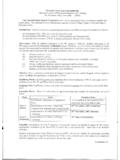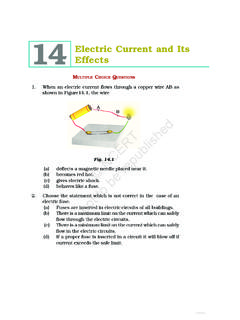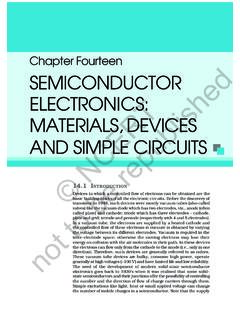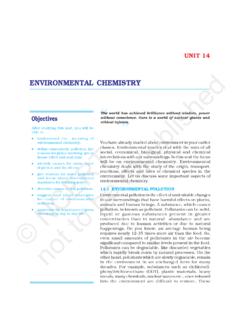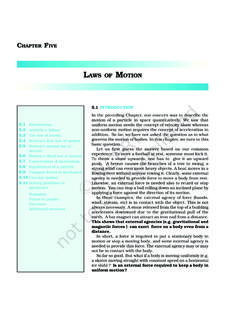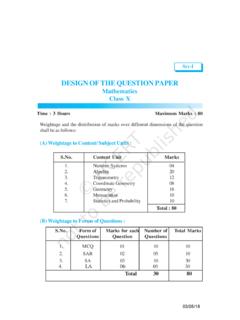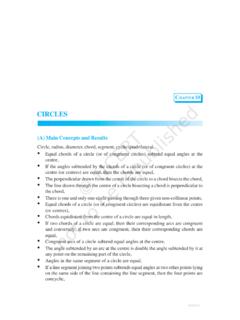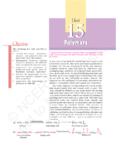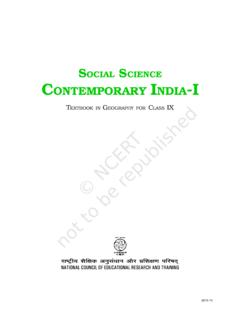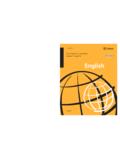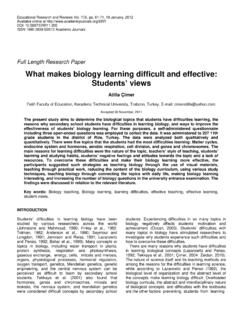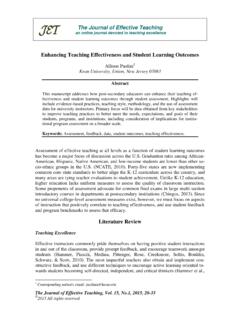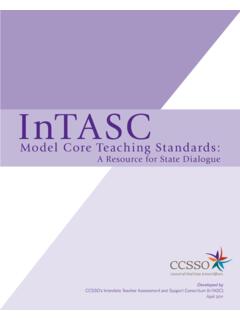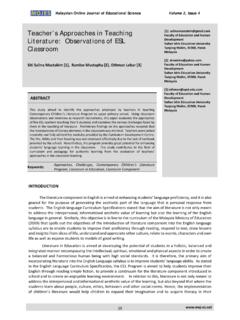Transcription of Draft TEACHING-LEARNING OF ECONOMICS WITH CASE …
1 Draft TEACHING-LEARNING OF ECONOMICS with CASE METHOD FOR SENIOR secondary TEACHERS DR. PRATIMA KUMARI DEPARTMENT OF EDUCATION IN SOCIAL SCIENCES National Council of Educational Research and Training Sri Aurobindo Marg, New Delhi-110016 i PREFACE The National Council of Educational Research and Training (NCERT) aims at bringing out improvement in the quality of school education. Toward this end, providing quality resource materials to students and teachers is important. NCERT develops curricular materials for all stages of school education in print as well as in electronic versions. Development of Teachers support material on teaching learning of ECONOMICS with case method at Senior secondary Stage started in 2012.
2 This material aims to: Encourage use of case studies for discussion purposes to engage students to look into socio- economic issues from multiple perspectives and understand how such issues are connected to their lives. Provide opportunities to explore various economic issues both from their day-to-day life and also issues which are broader and invisible in nature. teaching with case method provides an opportunity to reflect critically on issues in terms of their political, social, economic and moral aspects. It entails the acceptance of multiple views on socio- economic issues and a commitment to democratic forms of interaction. This is important in view of the multiple contexts in which our schools function. For instance issues related to human rights, caste, religion and gender can be critically reflected on by children in ii order to see how these issues are connected to their everyday experiences, also how different forms of inequalities become compounded and are perpetuated.
3 It facilitates collective decision making through open discussion and by recognizing multiple views. This material is developed collectively by practicing school teachers, teacher educators and economists teaching in universities and contains four chapters. In chapters 1 and 2, why and how to teach with case method has been explained and in chapter 3 and 4, some sample cases and questions for discussion for classes 11 and 12. NCERT appreciates the contributions of all teachers and experts for their help in development of this material. As an organization committed to systemic reform and continuous improvement in the quality of its products, NCERT welcomes comments and suggestions which will enable us to undertake further revision and refinement. Member-Coordinator Pratima Kumari Associate Professor of ECONOMICS Department of Education in Social Sciences iii CONTRIBUTORS OVERALL EDITING Dr.
4 A. K. Jain Professor of ECONOMICS (Superannuated) Department of ECONOMICS , Banaras Hindu University, Dr. Pratima Kumari Assistant Professor of ECONOMICS Department of Education in Social Sciences NCERT New Delhi-110016 REVIEWERS Dr. A. K. Jain Professor of ECONOMICS Banaras Hindu University Department of ECONOMICS R-6 Hyderabad Colony BHU Campus Dr. Deswal Professor of ECONOMICS Department of Humanities and Social Sciences National Institute of Technology Kurukshetra, Haryana-136119 Shri Hari Kishan, Lecturer ECONOMICS ACGSSS Jhilmil Colony Delhi-95 Ms. Chandrakanta GGSSS No. II iv PGT ECONOMICS Bholanath Nagar Shahdara Delhi-32 Dr. A. P. Singh PGT ECONOMICS CST Herbertpur Distt. Dehradun Uttranchal-248142 Dr. Rashmi Sharma PGT ECONOMICS Kendriya Vidyalaya JNU Campus New Mehrauli Road New Delhi-67 Dr. S. A. Israili PGT ECONOMICS CST Dalhousie Alvali Building Himachal Pradesh-176304 Dr.
5 Kamla Joshi PGT ECONOMICS Kendriya Vidyalaya Noida-24 v SPECIAL THANKS Dr. Saroj Yadav Professor & Dean (Academic) NCERT, New Delhi Dr. Gouri Srivastava Professor & Head DESS, NCERT, New Delhi Dr. Neeraja Rashmi Professor of ECONOMICS DESS, NCERT, New Delhi Dr. M. M. Goel Professor of ECONOMICS Department of ECONOMICS Kurukshetra University Kurukshetra Haryana-136119 Dr. Sunil Mani Professor of ECONOMICS Centre for Development Studies Thiruvanthapuram Dr. C. Veeramani Indira Gandhi Institute of Development Research General A K Vaidya Marg Goregaon (E) Mumbai-400065 Dr. O. P. Agarwal Professor of ECONOMICS (Superannuated) D-12, IInd Floor Kalkaji New Delhi Dr. Kanan Sadhu DEGSN, NCERT, New Delhi Dr. Mona Yadav DWS, NCERT, New Delhi Dr. Vandana Singh IGNOU vi Associate Professor of Education A-275 Sector-19 NOIDA 201301 Shri Ajay Gupta Assistant Professor of ECONOMICS Shyam Lal College (Evening) 1445/30 Vikas Nagar Gali-1 Sonipat Shri Sanjeev Kumar Assistant Professor of ECONOMICS Dayal Singh College (Morning) Delhi 55/FF-1, Gyan Khand-I Indirapuram, Ghaziabad U.
6 P. Ms. Ambika Gulati HOD ECONOMICS Sanskriti School S. Radhakrishna Marg Chanakyapuri New Delhi-110021 Dr. Rita Chaddha PGT ECONOMICS Kendriya Vidyalaya Puram Sector-8 New Delhi Mrs. Beena Satija PGT ECONOMICS Kendriya Vidyalaya Sector-4 New Delhi-110022 Dr. Srinivasan Assistant Professor of ECONOMICS DESS, NCERT, New Delhi Dr. Ashita Raveendran Assistant Professor of ECONOMICS DESS, NCERT, New Delhi vii ACKNOWLEDGEMENTS I am grateful to Head DESS Prof. Gouri Srivastava for her encouragement, emotional and moral support to complete this work in present form. I feel blessed to Dean (Academic) the then Head, DESS Prof. Saroj Yadav for her valuable suggestions during the planning, development and reviewing the material on case studies during 2012-13. I owe my deep gratitude to Prof.
7 Neeraja Rashmi, Professor of ECONOMICS , DESS for her guidance during the course of work especially in planning for the development of Cases. Without her support, this work could not be possible. The practicing school teachers have helped in many ways. I express gratitude to Dr. Hari Kishan PGT ( ECONOMICS ) ACSSS Jhilmil Colony Delhi, Dr. Chandra Kanta PGT ( ECONOMICS ) GSSS Delhi, Dr. Singh PGT ( ECONOMICS ) CST Herbertpur Dehradun, Dr. Israili PGT ( ECONOMICS ) CST Dalhousie Himachal Pradesh, PGT ( ECONOMICS ) JNV Bahraich , Mrs. Beena Satija KV New Delhi, Dr. Rashmi Sharma KV JNU Campus New Delhi, Joshi PGT ( ECONOMICS ) KV Noida, and Dr. Rita Chaddha PGT ( ECONOMICS ) KV R. K. Puram. Shri Sarfaraj and Mrs. Meenakshi, DTP Operators, Shri Jitender Kumar and Shri Hari Darshan typists, DESS, Mrs.
8 Chandrakala and Mrs. Anita Yadav Steno DESS helped me in typing, getting print outs and other related work. I feel that without their cooperation, this material could not be completed. viii CONTENTS Page Preface i Contributors iii Acknowledgements vii 1. Making learning of ECONOMICS Interesting 1 teaching with Cases 2 How to Teach with Case Method?
9 5 3 Cases for class 11 Indian economic Development 9 Statistics for ECONOMICS 22 4 Cases for class 12 Introductory Microeconomics 31 Introductory Macroeconomics 44 For Teacher s Feedback 56 1 Chapter 1 Making learning of ECONOMICS Interesting teaching with Cases What is ECONOMICS ? We live in a world of limited resources, and ECONOMICS helps us decide how to use these limited inputs to satisfy our never-ending list of wants and needs. This science of decision-making economic philosophy operates in our lives all the times, consciously or unconsciously.
10 Simply stated, ECONOMICS is the study of how society uses its limited resources in the present unlimited ever growing wants. It is a social science that deals with the production, distribution, and consumption of goods and services. It focuses on the four factors of production (land, labor, capital, and entrepreneurship) which constitute economic activities in contemporary world. ECONOMICS is split into the following two broad categories of study: Microeconomics is the branch of ECONOMICS that studies how households and firms reach decisions about consumption, production and price determination of goods and services. It focuses at the individual level, while macroeconomics looks at the decisions that affect the economy as a whole. 2 Macroeconomics is the branch of ECONOMICS that studies the overall working of an economy.
